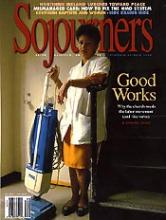"You can go all the way through any seminary in the country and probably never hear the words 'union' or 'justice in the workplace.' Frankly, we want to change that," says Kim Bobo, executive director of the National Interfaith Committee on Worker Justice (NICWJ).
NICWJ is in the business of building and rebuilding ties between religion and labor. Founded in 1996, the Chicago-based organization has grown to a network of 37 local groups, committed to educating and mobilizing the religious community on issues and campaigns to improve wages, benefits, and working conditions for workers, especially low wage workers.
The committee's latest project focuses on future religious leadersseminary students. The Seminary Track internship, a pilot program being developed in cooperation with the AFL-CIO, invites seminarians to explore, often for the first time, unions, the labor movement, and worker justice issues. Field placements will offer practical, intensive organizing experience, an opportunity to learn how unions operate, and a hands-on experiment in how religious communities can connect with workers and unions for mutual goals.
Bobo says the concept springs out of concern that young religious leaders, even those sensitive to justice issues, have very little knowledge of and no experience with the labor movement. "One of the most important things we can be doing is training future religious leaders to understand the labor movement and to understand the importance of working to support justice in the workplace."
Although in its beginning stages, the Seminary Track internship program has been certified as an alternative Clinical Pastoral Education (CPE) site within the Chicago area, allowing seminarians to do their field work requirement through NICWJ's office. Presently, 15 to 20 seminaries representing a range of denominations are linked to several of the local groups affiliated with NICWJ.
Read the Full Article

